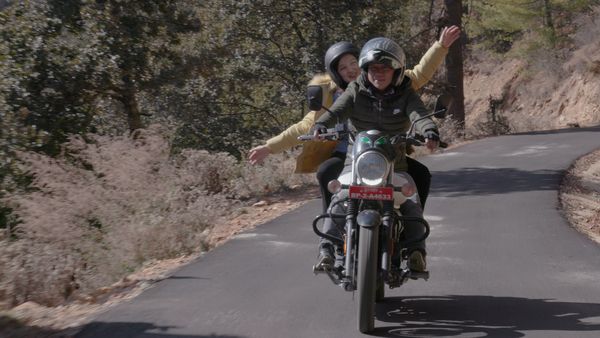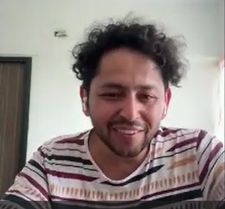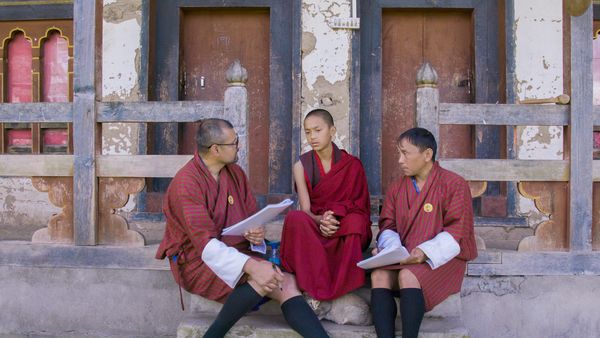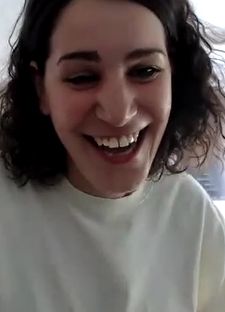 |
| Amber and Sarita in Agent Of Happiness. Bhattarai on Amber: 'He was genuinely searching for somebody' Photo: Dogwoof |
Agent Of Happiness charts the work of Amber, a Bhutanese government employee, who travels up and down the country surveying people’s happiness. His results all go to help generate Bhutan’s Gross National Happiness Index, which has been running since the Seventies is based on everything from a person’s sense of wellbeing and outlook to how many donkeys and cows they own. As the film accompanies Amber it considers the multi-faceted nature of what we call “happiness” and how we quantify it, not just from his interviewees’ responses but his own.
Chatting with directors Arun Bhattarai and Dorottya Zurbó as the film screened at Sheffield DocFest, ahead of its release in UK cinemas on July 12, it only seemed fair to start by asking them how happy they both were, out of 10, that day.
“I’m very happy, nine,” said Bhattarai, who has grown up with the GNH index in his homeland, adding: “I always think we should keep one aside.”
 |
| Arun Bhattarai: 'We have great teamwork' |
That country difference is something that the pair use to their advantage when working as a team as it enables them to have an ‘inside’ and ‘outside’ perspective simultaneously. They met about 11 years ago as part of the Doc Nomads masters scheme which brings two dozen students together each year, taking them to different countries and immersing them in different cultures to make short films.
That was the start of the collaboration. “Later we made our first film together,” Bhattari recalls adding that after the second one, “it has, it has really become a very spontaneous exercise for us now, because when we start thinking about an idea, we instantly talk about it with each other. I think our collaboration is really helpful because for me to do a film in Bhutan, everything is so familiar. And sometimes I don't look at it from the outside and there are certain things which are really special but, for me, they're not special any more, because I'm so used to it. So it really helps that Dory is looking at these things from a different view. And Dory is very analytical. But I think because I come from a television background, I'm more practical in the field. So we have really great teamwork.”
Zurbó adds: “I think it really helps the creative process that we come from different cultural backgrounds because also we become more reflective of ourselves and how we see the reality. Through 11 years of collaborating together, we’ve really got to know each other and understand each other's vision. We inspire each other with ideas.
“At the same time, we can also create a dialogue, where we reflect and can see the reality through each other's eyes. But basically, this is also thanks to this, this beautiful Joint Master program where we were very studied together with Doc Nomads, because there were 24 students from all over the world creating documentaries in different European countries. We were trained to be reflective and to understand the other and how we can see the universe and how we can work with people in a different cultural environment.”
The pair began their latest collaboration in 2019 and worked on it for almost five years. Logistically, Bhattarai was the man on the ground as he still lives in Bhutan.
Zurbó says: “He was constantly in touch with the characters and I was travelling from time to time there whenever I got the visa. But at the same time, when we started editing the film and the post-production, we did it in Hungary. So I was more responsible for the editing. But at the same time Arun was shooting and we were constantly communicating with each other. I think because of the previous film that we did together, we somehow developed a working method - how to direct documentaries when we are 1000s of kilometres away from each other.”
 |
| Bhattarai: 'We especially learned from people in rural areas where they were pretty much living life on a very daily kind of basis' Photo: Dogwoof |
He adds: “With most of the secondary characters, we found them while doing the survey itself, through very spontaneous meetings, we found them and really fell in love with their stories and we wanted to dig a little bit deeper with them. After the survey filming itself, we returned to them from time to time over three years, finding time to build a relationship with them as well. We were also trying to tell them that what we are doing is not normal reportage but a documentary so that they understood why we are returning to them again and again.”
Although Agent Of Happiness is country-specific, the idea of happiness is, of course, universal. When we see Amber and his new girlfriend Sarita taking photographs it's a reminder that we all pose and, for that matter, “create” these sorts of moments of apparent happiness.
In terms of the technology, Zurbó says: “We also wanted to portray how people are so attached to their phones. For example, the teenage girl, she's doing TikTok videos and dreaming of being a policewoman because she saw a video on TikTok. And Amber is always scrolling through the profile of Sarita. Somehow all the dreams are connected to phones and technology.”
Bhattarai describes Amber as “a young soul”.
 |
| Dorottya Zurbó: 'I think it really helps the creative process that we come from different cultural backgrounds because also we become more reflective of ourselves and how we see the reality' |
Although there are cultural specifics, the global similarities also make themselves felt. When an elderly man looking out at a vast swathe of countryside notes how much construction there is nowadays, it’s hard not to hear the echoes of any number of news voxpops elsewhere around the globe.
“Our intention with the concept is that Bhutan is often so exoticised, that it's a place where people are living harmoniously together with nature, and everyone is happy. But obviously, human existence is universal and we wanted to depict a more realistic portrait of the people in Bhutan, who also have struggles, loss and pain. But I think what makes them very peculiar is how Bhutanese people deal with their pain, and what are the mechanisms for overcoming that. As Arun mentioned, the acceptance of pain, or how we appreciate the things we have or how we appreciate the moment, or the close relationships that we have, and what they value in life and not, all the time, wanting more. Chasing dreams, desires, but somehow being a bit more grounded.”
So far the directors’ two feature collaborations, Agent Of Happiness and their previous film The Next Guardian have had Bhutan as their focus. I ask whether they’ve every wondered about flipping the dynamic and heading to Hungary.
Bhattarai says: “That's a great idea. I think, I mean, why not? Because we have worked on short films in Hungary before. It's a good idea. We have a great collaboration and it would be interesting for me to bring my Bhutanese eye to a Hungarian film for sure.”
Zurbó adds: “Yes, we work together on Hungarian subjects. Arun helped to shoot my previous film in Hungary, Easy Lessons. But, for sure, it would be an interesting project to measure the happiness level of Hungarians.”
Agent Of Happiness is being released by Dogwoof in the UK on July 12





















